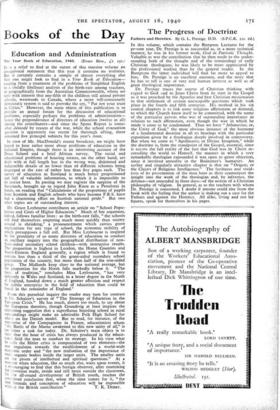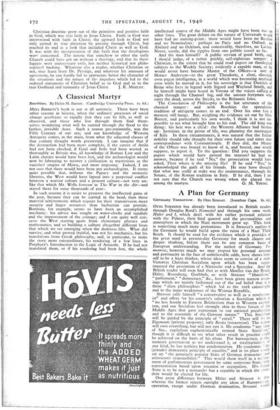The Progress of Doctrine
Fathers and Heretics. By G. L. Prestige, D.D. (S.P.C.K. 125. 6d.)
IN this volume, which contains the Bampton Lectures for the present year,-Dr. Prestige is as successful as, in a more technical manner, he was in his former work, God in Patriotic Thought. Valuable as was the contribution that he then made to the under- standing both of the thought and of the terminology of early Christian theologians, he was likely to be more appreciated by the professional student than by the general reader. In the Bamptons the latter individual will find far more to appeal to him. Dr. Prestige is an excellent narrator, and the story that he has to tell is one of very real human interest as well as of great theological importance.
Dr. Prestige traces the course of Christian thinking with regard to God and to Jesus Christ from its start in the Gospel as it was preached by the Apostles and first Christian missionaries to that settlement of certain unescapable questions which took place in the fourth and fifth centuries. His method in his six central chapters is to link some religious affirmation or demand, to which the Church knew itself to be committed, with the name of the particular person who was of outstanding importance in relation to such affirmation, even though the way in which he made it came to be condemned. Thus we have " Athanasius; or, the Unity of God," the most obvious instance of the harmony of a fundamental doctrine in all its bearings with the particular exposition given by a theologian deeply involved in controversy. But when we come to " Apollinaris; or Divine Irruption," while the doctrine is, from the standpoint of the Gospel, essential, since it asserts the full reality of the fact that God was in Christ re- conciling the world to Himself, the manner in which a very remarkable theologian expounded it was open to grave objection, since it involved unreality in the Redeemer's humanity. An earlier and singularly attractive chapter is that on " Origen; or the Claims of Religious Intelligence." The freshness and vivid- ness of its presentation of the man have as their counterpart the insight into the work of the theologian and, by inference, the defence—not unneeded in these days—of the notion of a Christian philosophy of religion. In general, as to the teachers with whom Dr. Prestige is concerned, I doubt if anyone could rise from the book with the feeling that the author is making out a case for the Fathers and against the Heretics. All alike, living and not lay figures, speak for themselves in his pages. Christian doctrine grew out of the primitive and positive faith in God, which was also faith in Jesus Christ. Faith in God was intertwined with faith in Christ; the upward look to God not only gained its true direction by passing through Christ, but reached its end as a look that included Christ as well as God. It was with the interpretation of this faith that the theologians were concerned. The notion that somehow or other the early Church could have got on without a theology, and that its theo- logians were unnecessary evils, has neither historical nor philo- sophical backing. Whatever else a reader, whether Christian or not, may learn from Dr. Prestige, and whatever his measure of agreement, he can hardly fail to appreciate better the character of the situations and the nature of tlyt impulses which led to the ordered statements of Christian belief as to God and as to the
true Godhead and humanity of Jesus Christ. J. K. MOZLEY.



























 Previous page
Previous page